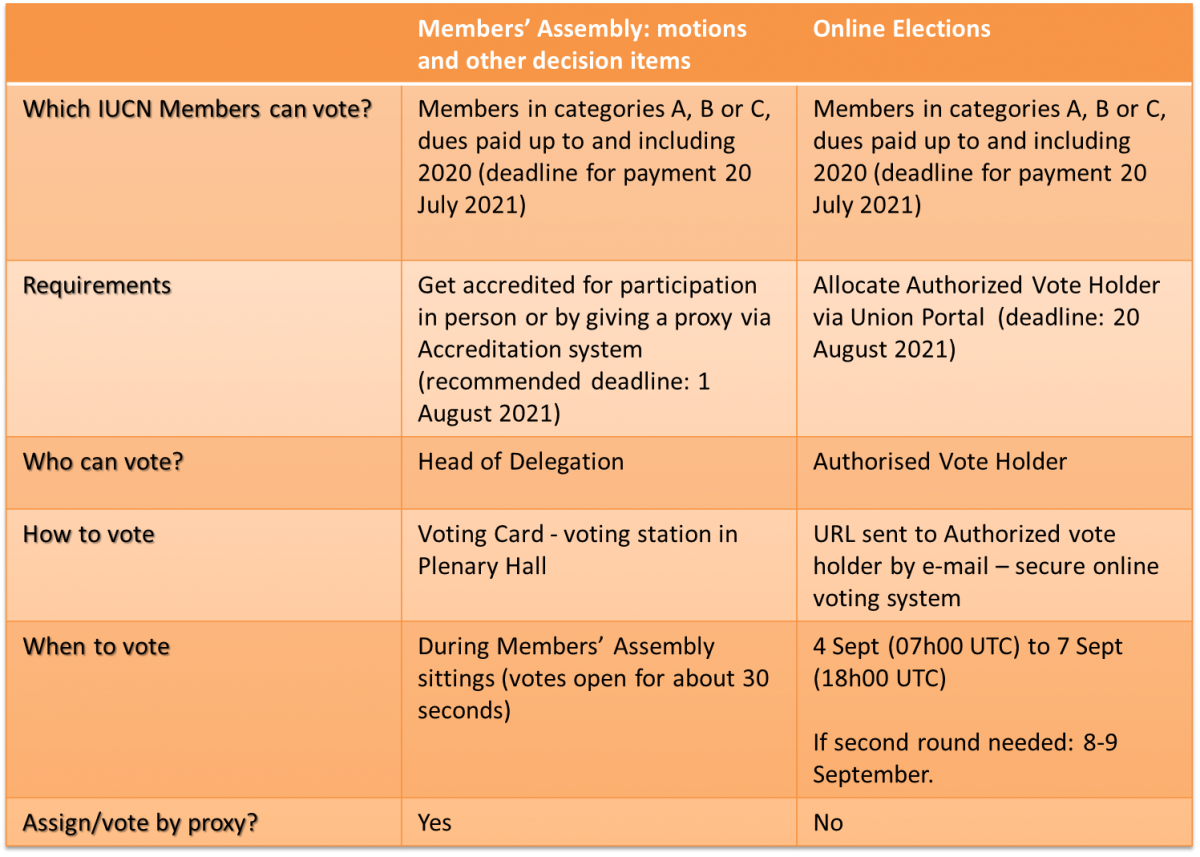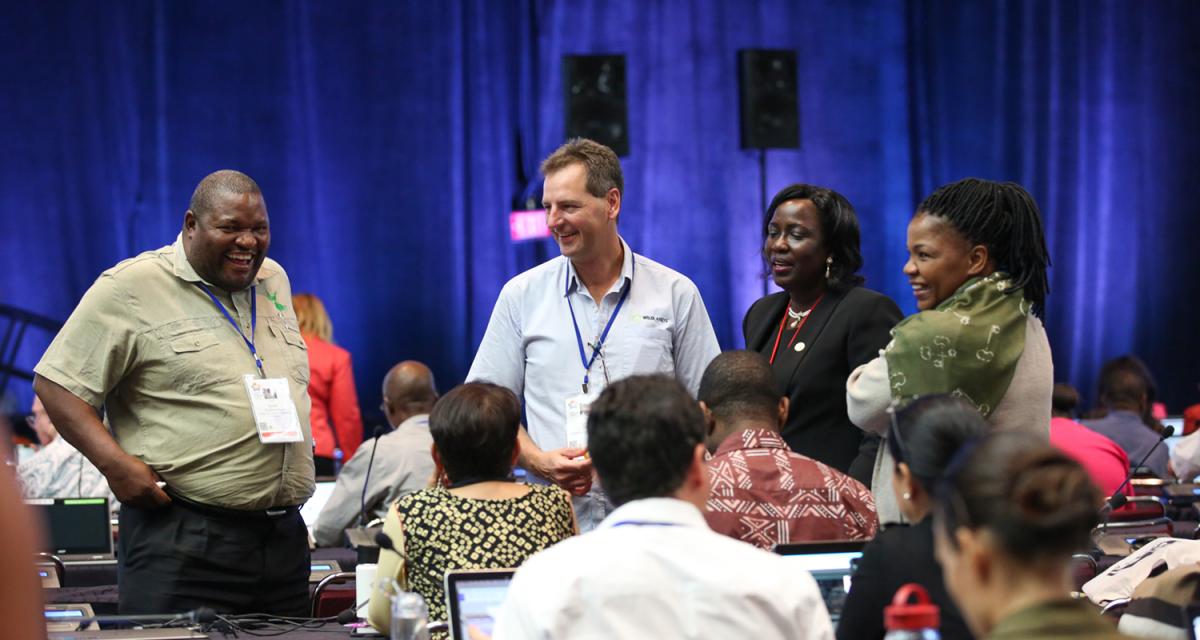Motions Process
- The electronic vote was scheduled for 7-21 October 2020.
- The decisions of the Motions Working Group regarding motions that are considered ready to be submitted to the electronic vote after the online discussion concluded, and those that require further debate at the Members’ Assembly in Marseille, along with the final versions of all motions, was published on 1 September 2020.
- The electronic vote results were published on 4 November 2020.
- The submission of new and urgent motions as per Rule 53, new and urgent motions “shall be submitted from one week prior to the opening of the Congress until the end of the plenary sittings on the first day of the Members’ Assembly”. Therefore, following the new Congress dates, Members will be able to submit ‘new’ and ‘urgent’ motions between 27 August – 4 September (2021 06:45 am UTC).
Date changes to other processes
The IUCN Council will continue reviewing the impacts of the postponement on Congress-related processes, and we will update the Congress website as well as communicate to Members in a timely manner. Please visit the General FAQs page for Congress preparation updates.
Frequently Asked Questions
Members’ Assembly
Participation in the Members’ Assembly is restricted to:
- Delegates of the Members of IUCN
- Observers
- Others who may be invited for specific purposes
- Members of the Council
- Members of the Commissions
- IUCN Director General and Secretariat staff
- Accredited representatives of recognised IUCN National and Regional Committees
- Accredited Press
- The public (under certain circumstances specified by the IUCN Council)
Elections Process:
IUCN Council elections to be held by an online vote open to all IUCN Members eligible to vote (present in Marseille or not)
The vote on elections will be open on 4 September 2021 at 07h00 UTC and close on 7 September 2021 at 18h00 UTC. If a second round for the election of the President is needed in accordance with Rule 81, paragraph (i.), an additional online vote will be opened for 24 to 30 hours during the Members’ Assembly (8-10 September 2021) in time for the results to be announced before the closing of the Congress.
In light of the exceptional circumstances created by the Covid-19 pandemic, and in accordance with the IUCN Statute, Regulations and Rules of Procedure, the IUCN Council has decided the following:
- IUCN Council elections shall be held by an online vote open to all IUCN Members eligible to vote (present in Marseille or not). For details, please refer to the elections page.
- Voting on motions and decision items other than elections shall take place by duly accredited delegates of IUCN Members onsite during the Members’ Assembly. For details, see the full decision C104/2 here.
- Contact Groups shall be organized virtually to allow Members off-site to participate in the discussion of content of motions.
Members should note that the online vote on elections and the onsite vote on motions and other decision items are two completely separate processes. More information and details will follow within the coming days and weeks but a table summarising the two processes can be found below.

Contact Groups shall be organized virtually to allow Members off-site to participate in the discussion of content of motions. It will mean that also delegates present in Marseille will have to connect to the virtual contact group meetings from their laptops, tablets or smart phones. The Resolutions Committee will decide in each case whether motions that, after a first reading, prove hard to negotiate in virtual meetings in order to achieve a consensus text, should be discussed in drafting groups meeting in person onsite (Rule 56). More information on the organization of the contact groups will follow soon.
Yes, Article 41 of the IUCN Statutes is very clear: “The terms of office of the President, Treasurer, Regional Councillors and Chairs of Commissions shall extend from the close of the ordinary session of the World Congress at which they are elected, until the close of the next ordinary session of the World Congress. The appointed Councillor shall serve for the remainder of the term for which the other Councillors are elected.”
Only the Head of Delegation or their replacement, as defined in Rule 6 of the IUCN Statutes, may speak on behalf of a Member organisation.
The rights of IUCN Members in connection with elections, voting and motions are suspended when their dues are one year in arrears[3].
Requests for the floor by Members who are not in good standing.
- If the Member wants to speak on a topic other than elections, voting and motions, they may be given the floor in the same way as any other Member delegate;
- If the Member wants to speak about elections, voting and motions (including procedural motions), they will not be given the floor unless there is enough time after the other delegates have spoken, as priority is given to Members in good standing.
Members in Categories A, B and C who are in good standing2.
Note: Only the Head of Delegation (i.e. duly authorized representative of the Member) or their replacement (as defined in Rule 6 of the IUCN Statutes) may vote on behalf of that Member.
Motions can be submitted at the Congress either by the Council or by a Member eligible to vote and in good standing, with the co-sponsorship of at least 10 other Members eligible to vote and in good standing. Such motions must be both “new” and “urgent”. As stipulated in Rule 53, so-called “new” and “urgent” motions shall be submitted from one week prior to the opening of the Congress until the end of the plenary sittings on the first day of the Members’ Assembly.
The Resolutions Committee may accept motions at the Congress only upon determination that:
- They are consistent with the purpose of motions as defined in Rule 48bis and meet certain requirements.
- The subject of the motion is “new” and “urgent” according to the following criteria:
- “NEW” means that the issue which is the subject of the motion has arisen, or has been subject to developments occurring after the closing of the deadline for the submission of motions and, at the time, could not have been foreseen; and
- “URGENT” means that the issue is of such importance that its consideration cannot wait until the next Congress before being presented as a motion.
Any delegate may propose amendments to a motion.
- The Resolutions Committee ordinarily receives amendments proposed outside a debate and decides whether they are in order.
- The relevant contact group receives proposed amendments to motions it is considering.
- The Resolutions Committee
- The Chair, if the amendment is proposed during debate on the motion.
- It must relate directly to the text it seeks to modify;
- The proposing author must sign it unless the proposal comes during a debate.
- It must be submitted in time to be distributed before it is debated unless the proposal comes during a debate.
- It must be submitted to the relevant group (Resolutions Committee or contact group).
-->
Contact groups are organised during World Conservation Congresses, and specifically, at the time of the Members’ Assembly to facilitate discussion and agreement around the text of particular motions before their vote by IUCN Members in plenary.
Guidelines for Contact Groups can be found here.
(Rule 57 of the Rules of Procedure)
When the consideration of the text of a motion has been concluded (e.g. when all requested interventions have been heard or when the Chair considers that the motion has been sufficiently debated), a vote shall take place on the text as a whole. Before that vote takes place, explanations of the text may be given, if the Congress so decides. Please note that in the case of amendments, these are voted upon first.
Most decisions are adopted by simple majority of the votes of the cast in both Category A, and Categories B and C combined.
However, some decisions, such as those regarding amendments to the Statutes, require a two-thirds majority of the votes cast in both Category A, and Categories B and C combined.
Voting is expressed by “Yes”, “No” or “Abstain”. Abstentions are not counted as votes cast.
Accreditation:
Delegates from Members and observer organisations/institutions are duly accredited, if they have registered for the Congress and if a Head of Delegation has been designated. The authorized representative of the organisation /institution should make the designation via the online Accreditation system.
Voting by Proxy:
Any Member who is unable to attend the Members’ Assembly or a sitting of the Assembly, may give a proxy vote to another Member that is eligible to vote and is duly accredited. It is also possible for a Member to give a proxy vote to the National/Regional Committee of its country/region.
The Electronic Vote on Motions
The vote took place between 7 and 21 October 2020, IUCN Members voted electronically on 109 motions, including 15 with amendments. The results are available here.
The “Authorized vote holder” of each Member eligible to vote will receive an electronic message from IUCN’s secure voting system with a unique URL, which will allow them to access the electronic ballot.
In the event that there is no designated “Authorized vote holder” for an IUCN Member, the Secretariat will allocate the role to the person listed as the “Head of Organisation” and to the person listed as the “Primary Contact” in the case of State Members.
Member can vote “Yes”, “No”, or “Abstain” for each motion.
No. However, Members are encouraged to vote on all motions.
-->
-->
Yes. Regardless of whether the motions are voted on electronically prior to the Congress or during the Congress, all those that are adopted will become Resolutions or Recommendations, and will enjoy the same value and status. Members also voted that, as an exception to Rule 62septimo of the Rules of Procedure, the motions adopted by this electronic vote become effective immediately rather than later on at the Members’ Assembly.
[1] The Rights and Obligations of IUCN Members are defined in Article 12 of the IUCN Statutes.
[2] In good standing: Members who have paid their dues up to and including 2020. Under Article 13(a) of the IUCN Statutes, the rights of a Member in connection with elections, voting and motions shall be suspended when the dues of that Member are one year in arrears.
[3] Article 13(a) of the IUCN Statutes.
If you need further clarification regarding the motions process, please do not hesitate to contact motions@iucn.org.
For any questions regarding other aspects of the Members’ Assembly, please contact assembly@iucn.org.



